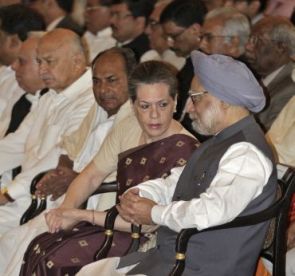 Seeking to dispel the perception of gloom amid scams and controversies, the United Progressive Alliance on Wednesday painted a rosy picture of its government's performance during the last nine years, contending the fruits of economic growth have reached both urban and rural areas.
Seeking to dispel the perception of gloom amid scams and controversies, the United Progressive Alliance on Wednesday painted a rosy picture of its government's performance during the last nine years, contending the fruits of economic growth have reached both urban and rural areas.
In the 'Report to the People', released by Prime Minister Manmohan Singh and Congress President Sonia Gandhi on the fourth anniversary of UPA-II, the government presented figures to highlight growth in employment and doubling of wages under MNREGA, three-fold increase in food subsidy, growth in social sector schemes and tele-density.
The function organised for the release of the report at the prime minister's residence was attended by Congress allies NCP chief Sharad Pawar, RLD chief Ajit Singh.
Congress Vice President Rahul Gandhi, Finance Minister P Chidambaram and Defence Minister A K Antony were among the key leaders present at the ceremony.
Parliamentary Affairs Minister Kamal Nath termed the completion of UPA's nine years in government as a "moment of celebration and rejoicing".
Talking about economic security, the report said consumption has "increased phenomenally" both in urban and rural areas "as fruits of economic growth reached the people".
The UPA painted the positive picture at a time when the government is hit by scams and controversies.
READ: UPA-II government's report card
Due to government's pro-poor policies, consumption in rural areas registered an increase of 3.4 per cent from mere 0.8 per cent during 1999 to 2004 (when NDA was in power), it said.
"This establishes the fact that the economic growth during UPA is both inclusive and widespread," it said.
Credit and loan facilities to micro, small and medium enterprises (MSME) have been more than doubled during the last five years, the UPA said in the annual report.
The report said MNREGA, "the largest social welfare scheme of its kind in the world started by UPA in 2006" has benefitted every fifth rural household in India.
Wages given under MNREGA per day have almost doubled from Rs 65 to Rs 128 since the launch of the scheme, it said.
In 2012-13, the scheme provided employment to more than 4.8 crore households, generating more than 213 crore person-days of employment at a total expenditure of more than Rs 39,000 crore.
Referring to food security, the UPA report said food subsidy has seen a three-fold increase during UPA tenure, reflecting the government's commitment to ensure adequate food at affordable prices at all, especially the poor.
In this context, it said the UPA government is committed to enactment of the National Food Security Bill which legally entitles families under Antyodaya Anna Yojana to 35 kg of foodgrains per month and other families for 5 kg per person at subsidised rates under Public Distribution System.
The report also spoke about strengthening agriculture sector which entails five-fold increase in agriculture credit and has led to a record production of foodgrains in recent years.
It mentioned that the UPA government has been "steadily enhancing" the minimum support price (MSP) for agriculture products for farmers' welfare.
MSP for wheat and paddy has more than doubled from 2004-05 to 2012-13 while that for cereals, it has increased three-folds and is now better than wheat and rice MSP, the report said.
With regard to internal security, it said the situation in Jammu and Kashmir improved rapidly since UPA came to power as it adopted a multi-pronged approach in militancy-affected areas.
"Militancy-related incidents witnessed a ten-fold decrease as the central and state governments worked in close cooperation and coordination," it said.
During the last four years, the report said, left-wing extremism-related incidents came down by more than half due to UPA government's approach of dealing with the issue in a holistic manner in the areas of security, development, ensuring rights of local communities and good governance.
About social security for special sections, it mentioned the 15-point programme, the multi-sectoral development programme and the various scholarship schemes for minorities and said the minorities are benefitting from these.
Fifteen percent of all priority sector lending from banks now reaches minorities to help them start and expand small businesses, the report said.











 © 2025
© 2025